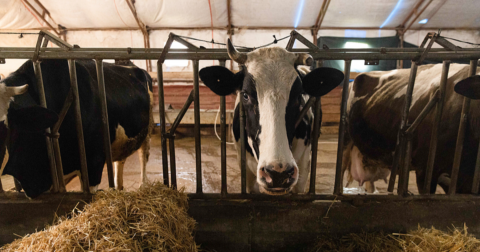Fact Check
There Is Nothing Especially Healthy About Regenerative Meat
Health•4 min read
Explainer
Is there a link between dairy and cancer risk? The evidence isn't conclusive but we took a closer look at what we do know in this explainer.


Words by Björn Ólafsson
Got milk?
If Big Dairy has anything to say about it, you do. For decades, the milk industry has been promoting milk as a nutritious and even critical part of the American diet, especially for children.
But milk from other species is not essential for any human’s diet — cow’s milk is intended for baby cows, not adult humans. Further, research into the nutritional value of dairy in recent years has shown that milk is not a miracle beverage. In fact, it may cause some risk to anyone who drinks it every day.
We can look to nutrition research to answer this question but it’s important to keep in mind that what these studies find can’t necessarily be applied to you as an individual — your own stage of life, genetics and lifestyle factors will all play an outsized role in influencing your health. Nutrition studies are also observational, so we can expect some results to point to a correlation between diet and health outcomes. But as statisticians are fond of saying — correlation is not causation. In other words, a correlation between, say, drinking large amounts of milk and cancer doesn’t actually mean that dairy causes disease.
The dairy industry has long promoted dairy as beneficial to bone health, but there isn’t robust evidence to back that up.
Countries with higher dairy consumption tend to have higher risks of osteoporosis in later adult years, although this is just one correlation. Bone health can be linked to many factors, including lifestyle and diet, so it can be difficult to close in on an exact risk factor.
Yet nutrition studies are beginning to reveal that dairy is not necessarily the holy grail once promised by the milk industry. In one meta-analysis of multiple nutrition studies published in the British Medical Journal in 2015, researchers found no association between higher milk consumption and a smaller number of broken or fractured bones. And in a study published in the Journal of the AMA Pediatrics in 2014, researchers found that men who drank more dairy in their teen years were actually slightly more likely to break bones in later years, although this effect was not found in women and was also likely influenced by height.
The opposite was found in another study published in the British Medical Journal in 2014: women who drank more milk were more likely than men to suffer broken bones, though the authors advised approaching the results with caution. A further study published in the Archives of Pediatrics and Adolescent Medicine in 2012 found that vitamin D could help prevent stress fractures in later life, but calcium intake and dairy consumption did not play a role.
The researchers of most of these studies suggest caution: we don’t know the exact mechanisms behind fractured bones. On the other hand, there is no reason to assume that dairy will prevent any bone breaks in your old age.
Research into the link between drinking milk and cancer has yielded conflicting results. A 2022 meta-analysis — otherwise known as a study of studies — did find a higher risk of cancer mortality for women with high rates of milk consumption than lower milk-drinking rates, but also lower rates of cancer mortality with drinking fermented milk products, and no difference overall for butter or cheese (yet the study did find an increased risk of colorectal cancer mortality with high rates of cheese consumption). The same analysis found a higher risk of cancer mortality in women who drink milk for ovarian, liver and prostate. The findings lined up with previous meta-analyses in some ways, but differed in others. So, as scientists are fond of saying, more research is needed.
A 2020 study of more than 50,000 women found that women who consumed cow’s milk had a 30 percent higher risk of developing breast cancer. Another study published in the Journal of the National Cancer Institute in 2013 found that American women with breast cancer who consumed more than one serving of high-fat dairy a day had a 49 percent higher mortality rate.
Dairy is naturally high in hormones, especially estrogen and progesterone. It is easy to see why: Dairy is naturally produced in the mammary glands of the female cow as food for her young. Because of the intensive farming methods that dairy cows endure, including longer milking periods, industrialized dairy milk often contains even higher levels of estrogen.
A study published in Pediatrics International in 2010 postulated that the estrogen hormones in dairy milk can be absorbed by the human body, and can even decrease testosterone, although the study had a small sample size. Full-fat dairy has been reported as correlating with slightly decreased progressive motile sperm count in young men, which could lead to impaired fertility, though this link requires further research.
Soy milk, an alternative to cow’s milk, contains phytoestrogens and studies have shown that these nutrients are not associated with negative health outcomes.
Historically, dairy has only been widely consumed in certain parts of the world. Many people, especially those of Asian or African descent, are unable to fully digest dairy, and are lactose intolerant. As adults age, lactose intolerance can increase for many people. This is because we are less able to produce lactase, an enzyme that breaks down lactose. Dairy can cause gastrointestinal problems for around 65 percent of the world’s population.
The presence of lactose intolerance can be as low as 4 percent in Western or Northern European countries like Denmark or Ireland and as high as 90 percent to 100 percent in Asian and African countries like South Korea and Ghana.
Dairy is one of the most damaging foods for the environment. When compared to other forms of milk — oat, rice, soy and almond — dairy consistently ranks as more water intensive, more land intensive and higher in methane and carbon emissions. Even thirsty almond trees use only about half of the water that dairy milk requires, and far less land.
Industrial dairy farms typically house more than ten thousand cows in a single albeit large barn with concrete floors — the animals are confined in these barns with little to no outdoor access other than the walk to the milking parlor.
Like all mammals, including humans, dairy cows only produce milk after becoming pregnant and giving birth. Dairy farmers control this process, impregnating cows about four to five times, at which point they are then slaughtered for beef.
A standard part of dairy farming is taking the newborn calf away from its mother, either selling the calf to the veal industry, raising them for meat or, in the case of some female calves, raising them to become dairy cows themselves. Studies have shown this separation process causes cows to show signs of emotional distress, including bellowing for her offspring.
If you are not lactose intolerant, your body digests dairy using enzymes in your digestive tract. But if you are lactose intolerant, you lack the enzymes to break down dairy, and after consuming a certain amount of lactose your gastrointestinal system will experience indigestion and other problems.
Many tout the health benefits of goat’s milk and enjoy eating goat cheese. According to the USDA, goat’s milk has a bit more protein and fat than cow’s milk, as well as more potassium, phosphorus and magnesium. However, goat’s milk still has a similar environmental footprint per gallon to cow’s milk.
Dairy can be a part of a well-planned diet. Researchers have not found any link between daily dairy consumption and all-cause mortality, which means that overall it is unlikely to cause any significant harm to an otherwise healthy person.
No, nutritionists and scientists agree that dairy is not essential for human nutrition.
Every nutrient found in dairy can be found in other sources, such as in dairy-free milk alternatives like fortified unsweetened soy milk. A well-planned and diverse plant-based diet can be healthful for everyone.
You can shift to a plant-rich diet by drinking dairy alternatives like almond milk, oat milk, soy milk, cashew milk and rice milk. Any of these options are better than dairy for both planetary and public health, without sacrificing personal nutrition.